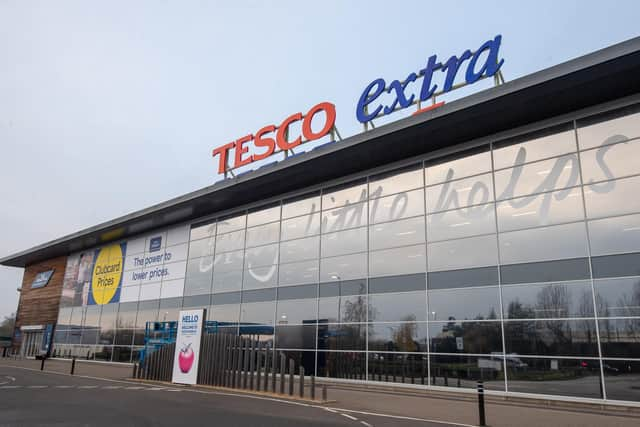Tesco serves up some good news on inflation front as pre-tax profits hit £2.3 billion: reaction
Tesco has “cemented its position as the pre-eminent grocer of the British aisles” is how one analyst summed up the retail giant’s annual results.
Pun making aside, the headline numbers from the UK’s largest retailer were certainly impressive. An adjusted operating profit of £2.83 billion for the year to February 24 was up almost 13 per cent on the previous year. At the closely-watched pre-tax level, profits hit £2.3bn, up from £882 million previously, while overall sales rose by 4.4 per cent to a whopping £68.2bn. That’s a fair amount of Clubcard points.
Advertisement
Hide AdAdvertisement
Hide AdTesco’s upmarket Finest product range continued to take market share from its rivals with sales exceeding £2bn, an increase of 15.7 per cent, suggesting many shoppers are opting to spend a little more on their evening meal, at the expense of restaurants and the hospitality sector in general, which has been struggling amid the cost-of-living crisis. On those spending pressures, Tesco bosses noted that inflation in the grocery sector had “lessened substantially” - an observation that received a positive reaction from the City, both in terms of the FTSE-100 group’s own shares and the wider market.


Richard Hunter, head of markets at investment platform Interactive Investor, part of Scottish funds giant Abrdn, said: “Tesco has again cemented its position as the pre-eminent grocer of the British aisles, driven by a relentless focus on both value and quality. Its appetite for lowering prices for customers is enabled by its sheer scale and strength, falling food inflation and a significant cost reduction.
“In turn, this creates something of a virtuous circle, with more customers attracted by the likes of the group’s Aldi Price Match, Low Everyday Prices and Clubcard Prices. At the same time, it has also honed its upper end offering, with its Finest range continuing to take market share from its rivals.”
He added: “Inevitably, challenges will remain, even though Tesco is on the front foot to face them. Consumers have yet to see the benefits of falling inflation feed through to interest rates, although wage increases have offset some of these challenges. The group’s Home and Clothing unit reported a dip in sales of 3.4 per cent, largely driven by its decision to exit less profitable lines such as large electrical items, although at 7 per cent of total UK sales the decline has a limited impact.”
Tesco said retail like-for-like sales grew by 6.8 per cent for the year, as it benefited from a return to volume growth in the UK and Ireland in the second half of the year as easing price inflation led shoppers to buy more products. This offset a 17.2 per cent drop in fuel sales driven by falling petrol and diesel prices.


The group told shareholders it saw growth supported by investment to improve value, with the retailer cutting prices on some 4,000 product lines over the year. It was among major grocers to invest heavily into price improvements amid strong competition from German-owned discount brands Aldi and Lidl.
Tesco chief executive Ken Murphy said: “Customers are choosing to shop more at Tesco, which is reflected in growing market share as they respond to the improvements we’ve made to the value and quality of our products. Inflationary pressures have lessened substantially; however, we are conscious that things are still difficult for many customers, so we have worked hard to reduce prices and have now been the cheapest full-line grocer for well over a year.”
Martin Maloney, senior equity analyst at Killik & Co, said Tesco had reported a “good set of full-year results” as volume recovery supported revenue growth. “The core retail business continues to perform strongly, led by the UK as customers responded well to the company’s efforts to cut prices ahead of the market, its investments in service and market-leading availability,” he added. “We believe the shares are undervalued given the improvement in the underlying fundamentals of the business, Tesco’s strong competitive positioning in online and convenience, and [cash and carry brand] Booker’s future growth prospects.”
Advertisement
Hide AdAdvertisement
Hide AdTesco proposes to pay a final dividend of 8.25p per share, taking the full-year pay-out to 12.1p, an increase of 11 per cent.
John Moore, senior investment manager at RBC Brewin Dolphin, noted: “With the outlook beginning to turn more favourable, Tesco has put itself in a very good position among the UK’s supermarkets through a clear set of priorities, disciplined capital structure, a simplified business model, and investment in its customer offering. Shareholders should be in line to benefit through Tesco’s combination of share buybacks and an attractive dividend over the months and years ahead, which give it the potential of becoming a good compounder.”
In February, Barclays agreed a deal to buy the core retail banking business of Edinburgh-based Tesco Bank, including acquiring its 2,800 staff, most of whom are based in Scotland. The banking giant expects to pay roughly £600m for the credit cards, loans, savings and operating systems of Tesco. The news followed a period of speculation that the retail behemoth was considering selling its banking business in order to focus on its core retail operations.
Tesco Bank was founded in 1997 and has thousands of people working across its main centres in Edinburgh, Glasgow, Newcastle and Reigate.
Around 2,800 Tesco Bank colleagues working on banking products, and including the senior management team, will transfer to Barclays. Some remaining elements of the supermarket bank, including its insurance products, travel money and ATMs, are not included in the deal.
Comments
Want to join the conversation? Please or to comment on this article.